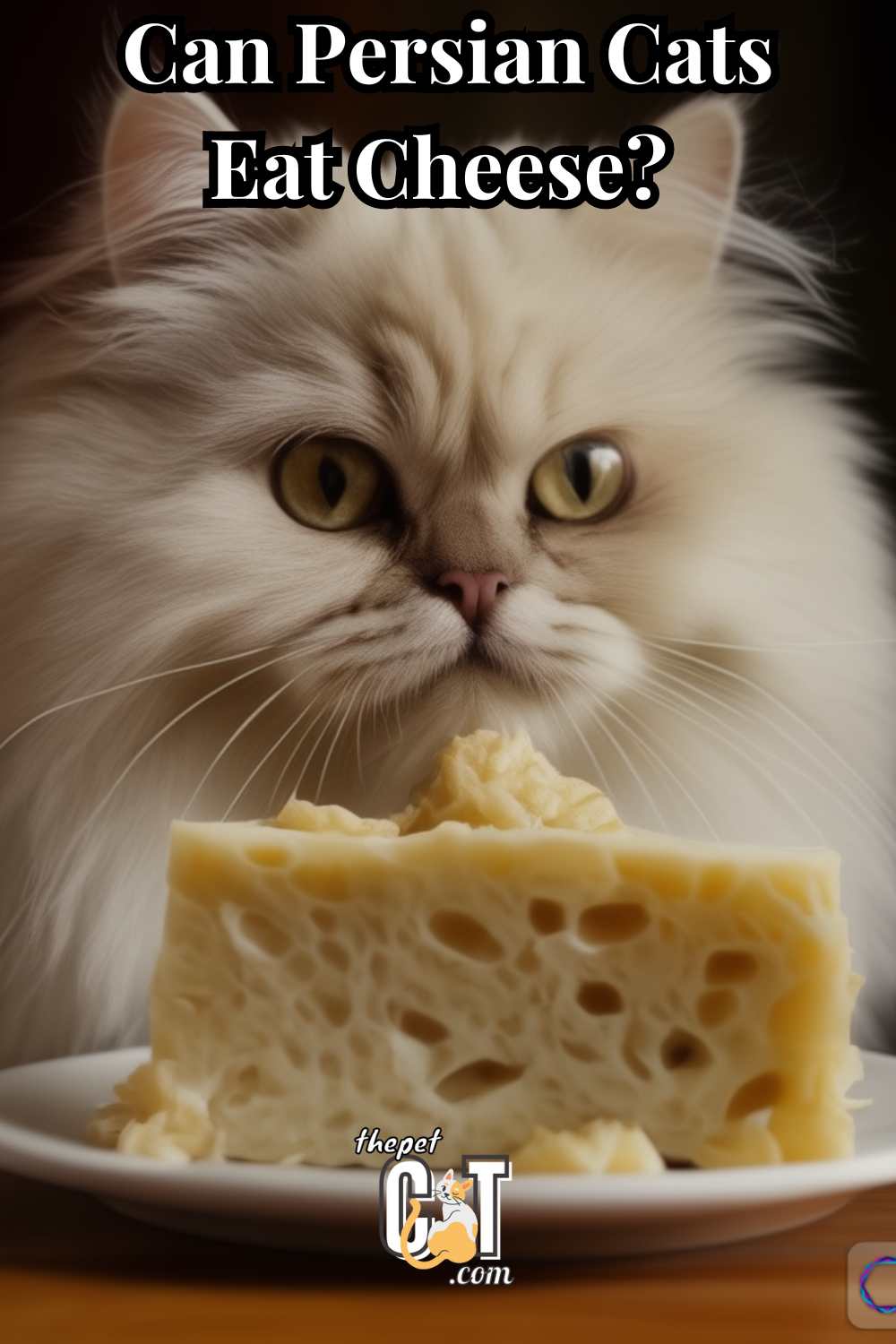Yes, Persian cats can eat cheese. Some may like this due to its protein content. But before you serve cheese to your cat, you need to consider whether your pet is lactose intolerant.
Additionally, its serving portion also. It’s wise to check its benefits and drawbacks first and then talk to the vet before deciding.
However, If you are also conscious about Can Persian cats eat Cheese? If yes, how can you safely feed it, you can scroll down below. Additionally, this article will introduce you to some potentially unsafe cheeses to avoid. Let’s check now.
Can Persian Cats Eat Cheese? A Detailed Answer
Cheese is a dairy product that comprises high protein, fat, and calories. Most cats’ digestive tracts are sensitive to dairy products. They can’t consume Cheese. And vomiting, tummy upset, etc., may result. So, experts suggest keeping it out of the essential list of foods that cats can eat.
However, though it harms most cats, many love Cheese. If your Cat finds it close to them, they may take a bite. That’s why Many owners have been conscious and asked,” Why does my Cat like Cheese? ”
Actually, the carnivorous Cat’s taste buds are designed to contain high protein, fat, and animal products. Cheese is made of the animal’s milk. So, It is also a great container of protein and fat. The smell of these components may attract cats. But if your Cat is lactose intolerant, keep it away from Cheese, though it loves it.
However, if you have a healthy Persian, a little portion may not cause any serious issues. Your kitty can enjoy a tiny bite-treat of it. So, you can offer it occasionally.
But if your Persian also has the same lactose intolerant issue, avoiding it is a better decision.
Read More:
How to Know if Your Cat is Lactose Intolerant
Your Persian Cat can eat Cheese safely or not; this answer depends on 2 things. 1st is if it is out of the lactose intolerant list, and 2nd is the portion.
Many people may be confused with this question: Are all cats lactose intolerant? The answer is no. Not every Cat has this issue.
However, check the below signs. If you can relate these signs to your Cat, you can confirm whether Cheese will be okay for it or not.
Signs of Lactose Intolerant Cat
- Diarrhea
- Abdominal pain
- Flatulence
- Vomiting
- Bloating
- Itching
- Dehydration
- Constipation
- Weight loss
- Excessive thirst
Pros and Cons of Feeding Cats Cheese
Feeding cheese can lead to some potential benefits, including some health risks. With some conditions, your Persian Cat can enjoy the benefits of Cheese. If your Cat is healthy and fine, you can get protein and fat with a tiny portion. But if your Cat is lactose intolerant, it can face some issues.
Let’s see what benefits it can gain and what difficulties it can face.
Pros
- Low carb treat
- High in calcium and protein
- Useful for hiding medication
- Cats enjoy the taste due to high fat and protein content
- Offers a tasty and enjoyable snack for cats
- Can be offered as a reward at training sessions.
- Helps to diversify their diet
Cons
- Hard for cats to digest, especially those sensitive to lactose
- Might lead to stomach issues like vomiting, gas, or diarrhea
- Not what cats naturally eat as meat-focused animals
- Other cat foods provide similar nutrients
- Too much can make cats gain too much weight
How to Feed Cheese Safely to Your Persian Cat?
To feed Cheese to your Cat safely and without upsetting their stomach, follow these simple tips:
- You can start with a modest amount and observe your Cat’s reaction. If they can tolerate it well, a tiny piece the size is suitable for an occasional treat.
- Sprinkle a bit of Cheese over their regular meal. This will entice picky eaters. However, remember, Cheese should be a treat, not a major part of their diet.
- Limit cheese intake to about 5-10% of your Cat’s daily calorie needs. Please be careful of the high fat and sodium levels.
- You need to opt for hard, aged cheeses like Swiss or Cheddar. They contain less lactose and are less likely to cause digestive issues.
- And try to avoid cheeses with added spices or mold. Otherwise, they can be harmful to cats. So, it’s wise to stick to plain varieties without any added ingredients.
- Consider cheese-flavored treats as an alternative if your Cat enjoys the taste without the risks associated with real Cheese.
Consult your veterinarian before adding cheeses or any new food to your pet’s diet. This ensures it’s safe and appropriate for them.
How Much Cheese Per Day for Cats is Safe?
According to Hill’s Pet Nutrition, an 1 ounce piece of cheddar cheese provided to a typical 10 pound feline is equivalent to that of a human consuming 2 and half pounds.
However, according to the calculation, you can offer 10 % of its daily intake. But as Cheese is a high density protein and fat food, 5% would be a more appropriate portion.
Most Unsafe Cheese: What Can Cats Not Eat
Some cheeses are low-lactose containers and safe options. Cheeses, especially aged and harder ones, are safe. However, below are some potentially harmful cheese options.
Blue Cheese
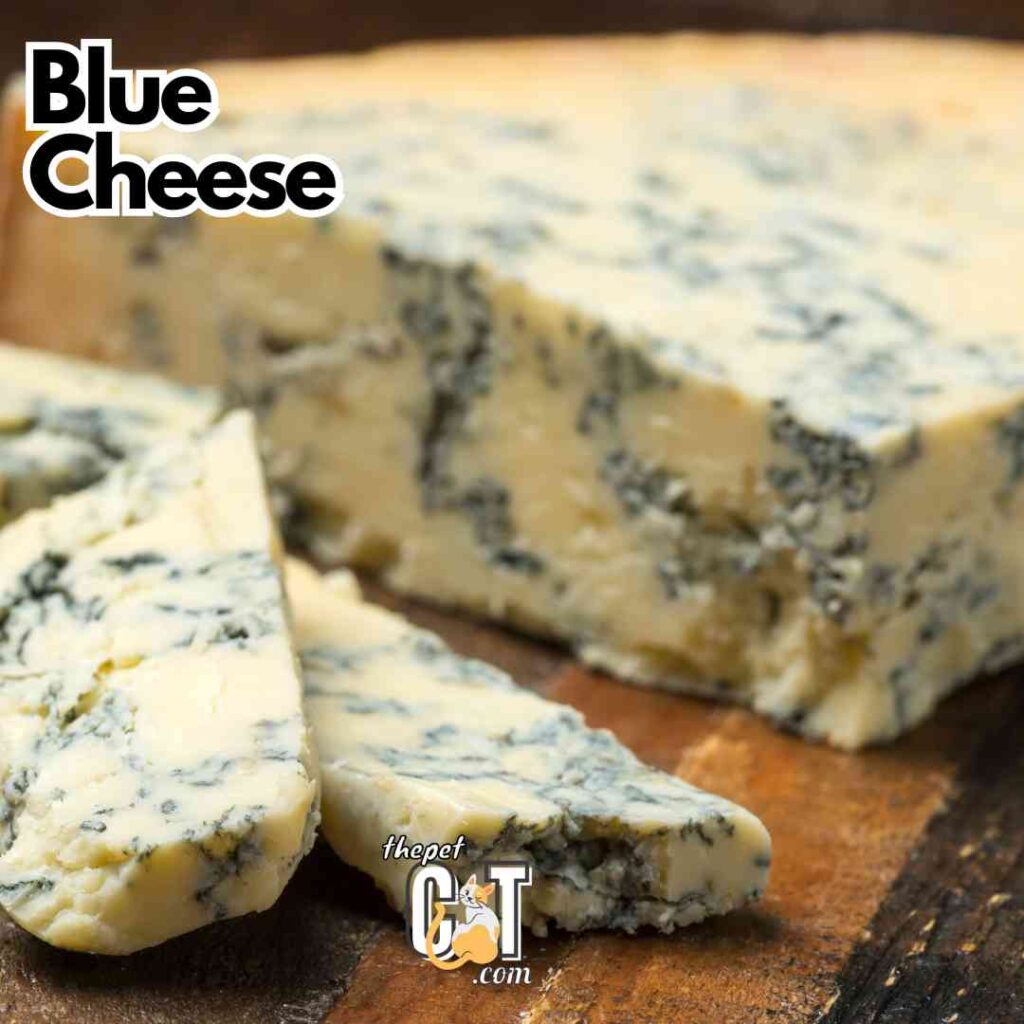
Many owners want to know: Is blue Cheese bad for cats? Yes, blue cheese aren’t safe for cats, because they contain molds that can harm them.
These molds, from the Penicillium genus, can cause stomach problems, organ damage, or poisoning. Despite having low lactose, blue Cheese is high in fat. This renders it dangerous for cats to consume. It’s wise not to provide it to them completely.
Brie
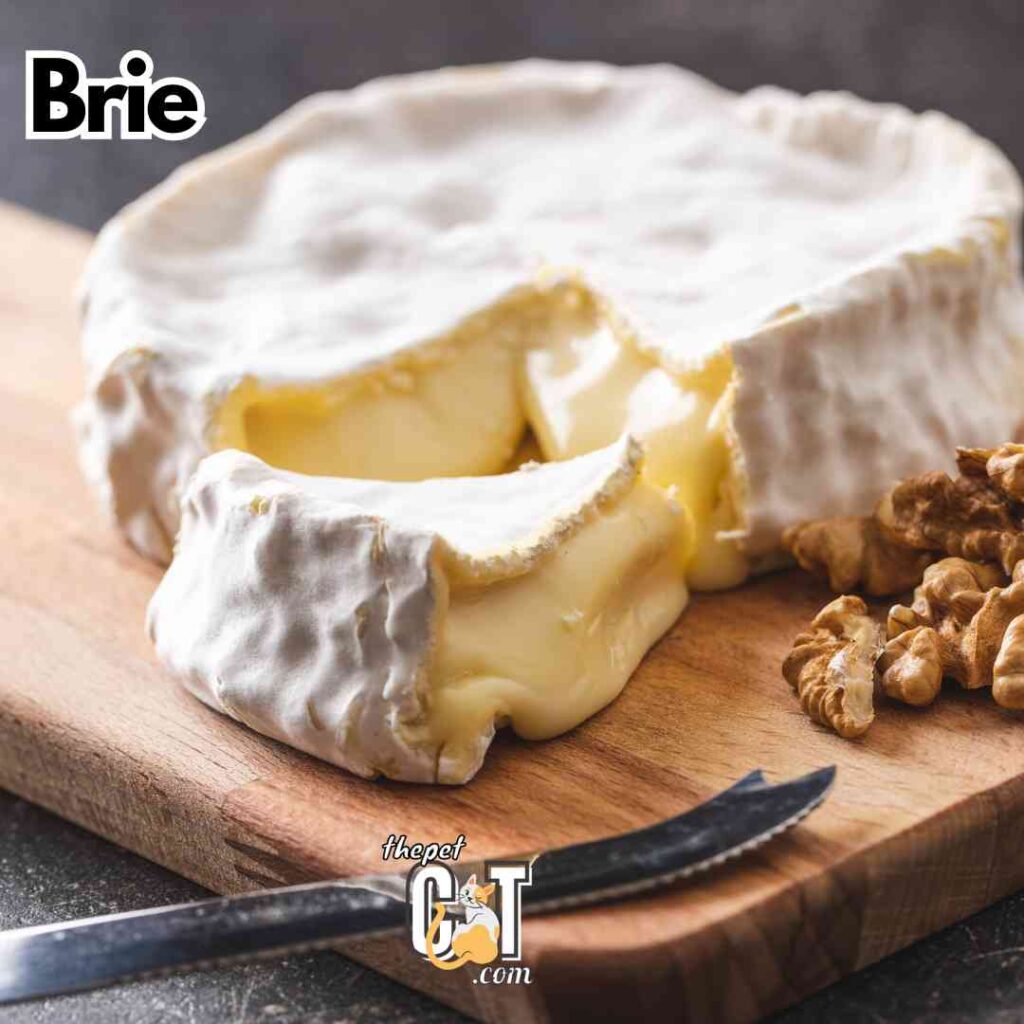
This Cheese is prepared from raw milk. Therefore, The danger of bacterial infection, including Salmonella and Listeria, can increase with this Cheese on cats. This can cause severe illness in cats. Before feeding cat cheese brie, keep these issues in mind.
Soft Mozzarella
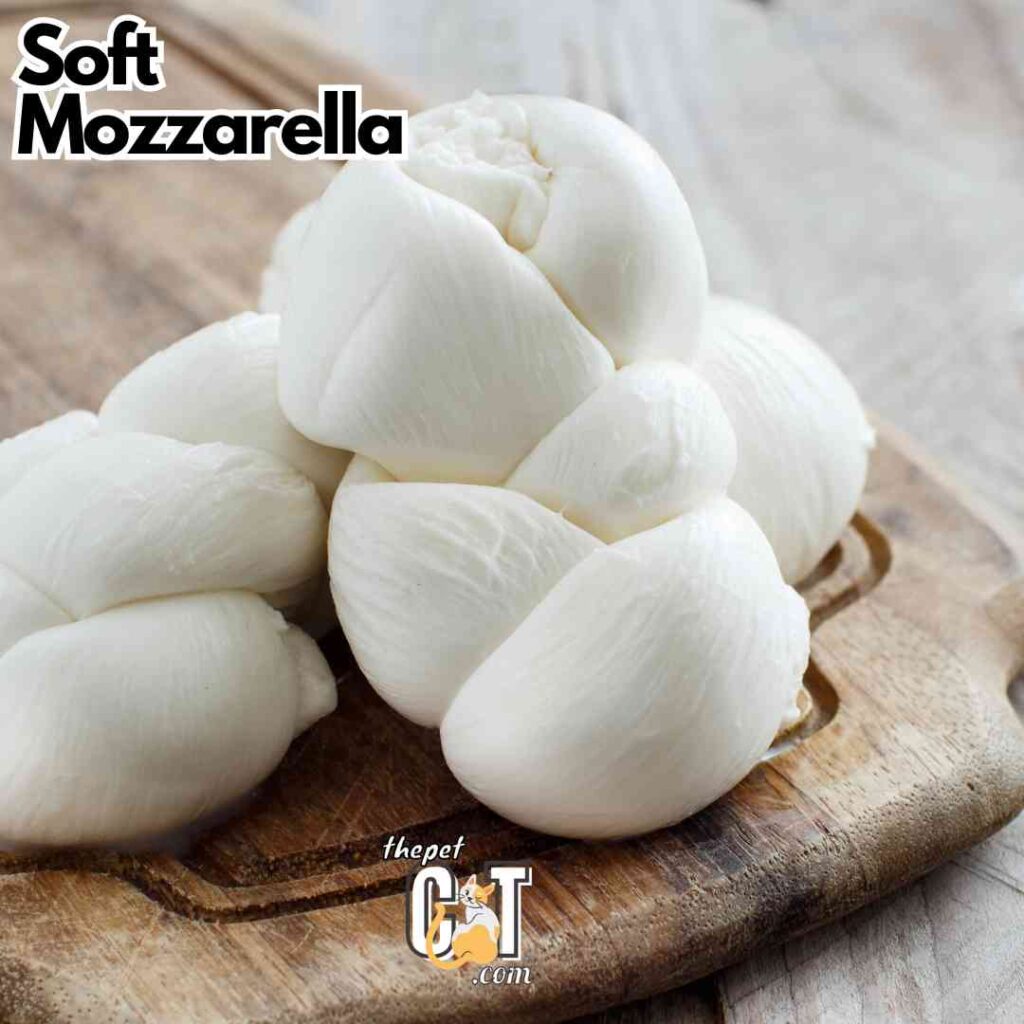
With its high lactose content, Soft mozzarella cheese for cats is harmful. It can cause digestive upset in Persian cats. Approximately 65% of cats are lactose intolerant. Consuming dairy products such as mozzarella may cause diarrhea and vomiting. Avoiding soft mozzarella can prevent such issues and maintain feline health.
Cream Cheese
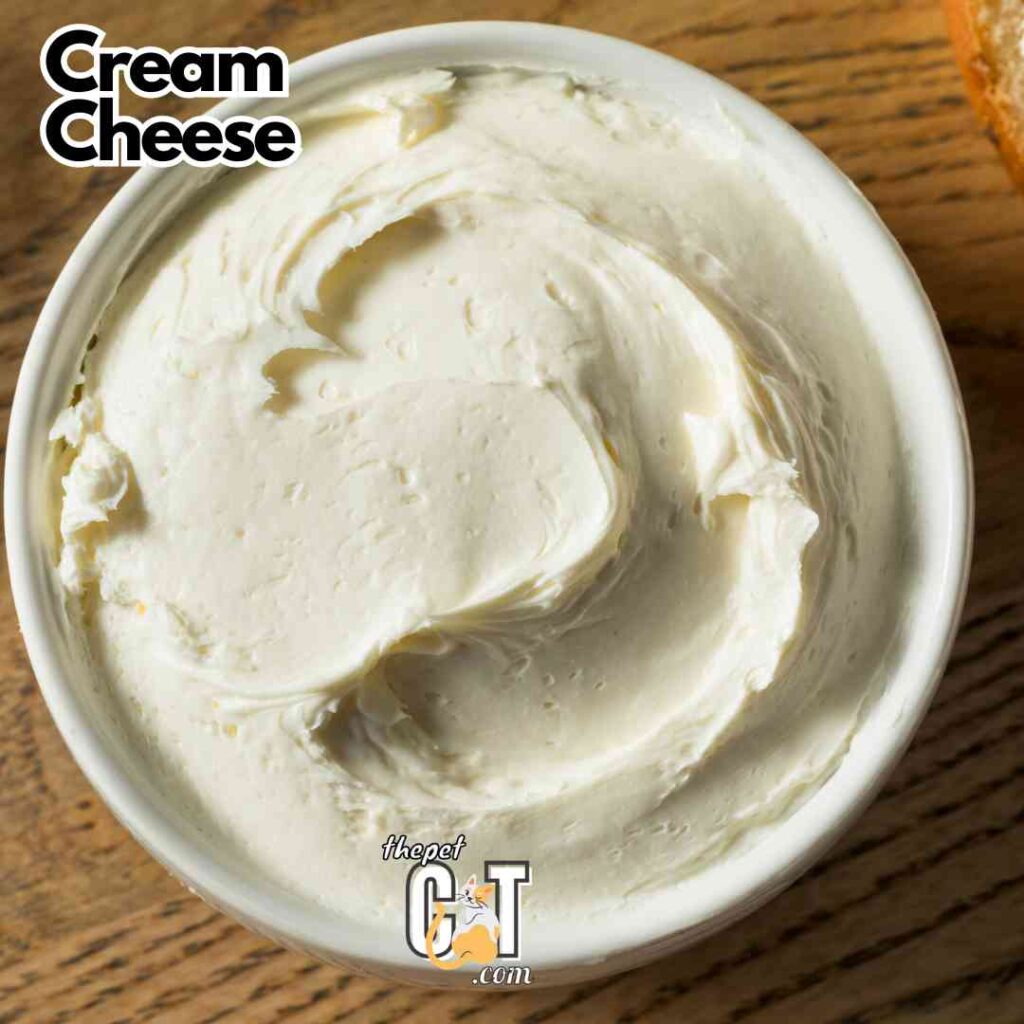
Cream cheese is another high container of lactose. This can cause your Cat Abdominal pain, Diarrhea, Flatulence, and Vomiting. So, avoiding this type of Cheese is a better decision.
Cheddar Cheese

While lower in lactose compared to some other cheeses, cheddar still contains lactose. They can pose a risk of gastrointestinal discomfort in cats with lactose intolerance.
FAQs
Can Persian Cats Eat Bananas?
Yes, Persian cats consume bananas as a supplementary food and in moderation. To read more:
Can Cheese Kill Cats?
No, Cheese does not typically kill cats. But it can cause digestive issues, especially in large amounts or if the Cat is lactose intolerant. It may cause gastrointestinal pain, vomiting, diarrhea, and other health issues for your pet. Therefore, it’s preferable to provide Cheese as an occasional pleasure in tiny amounts.
My Cat Ate Blue Cheese What Should I Do?
If your Cat has swallowed blue Cheese, keep a cautious eye out for any indications of disease. You need to contact your veterinarian immediately. Blue Cheese contains molds that can be harmful to cats. Your veterinarian can offer advice based on your Cat’s health and the quantity of blue Cheese consumed.
Can Cats Eat Pizza?
No, cats shouldn’t have pizza. It’s not good for them because it lacks nutrition and has ingredients like garlic and onions that are harmful to cats. Additionally, pizza is heavy in fat and salt. This can be bad for their health. It’s better to give cats healthier treats instead.
Final Verdict
Can Persian cats eat Cheese? While Persian cats can eat Cheese in moderation, it’s crucial to consider their lactose tolerance and choose appropriate varieties. Opt for hard, aged cheeses like Swiss, and avoid soft or moldy types like blue Cheese or Brie.
However, you need to observe your Cat for any bad effects and get specific nutrition guidance from your veterinarian.
Remember, Cheese should be an occasional treat, not a staple in their diet.
You May Also Like to Read:

